
A container ship has crashed into a bridge in the Suez Canal, the vital trade route between Asia and Europe.
The container ship One Orpheus lost control of its steering and collided with the bridge, the Suez Canal Authority said.
A spokesman for the authority insisted that traffic in the trade route in Egypt had not been interrupted by the collision.
There had been earlier reports that the eastern lane of the route had been blocked.
The incident conjures images of the grounding of the 400-metre long Ever Given ship in 2021.
The 220,000 tonne vessel, which is as long as the Empire State Building, left £6.5bn of global trade stuck every day during a six-day blockage of the route.
Read the latest updates below.
06:21 PM GMT
Signing off
Thanks for joining us today. Chris Price will be back in the morning with the latest markets news but I’ll leave you with some of our latest business stories:
05:22 PM GMT
McDonald’s plans 10,000 new restaurants over next four years
McDonald’s, which had 40,275 restaurants globally at the start of this year, is planning to open an additional 10,000 over the next four years, according to the Associated Press.
The fast food chain has benefitted over the past decade through investment in its technology, with self-service ordering screens now the standard way to order a burger at its UK restaurants – at a time of labour shortages and a rapidly increasing minimum wage.
The McDonald’s mobile app, self-service screens and delivery services now account for more than 40pc of the sales generated by franchised and company-operated stores across its top six markets, which include the UK, according to its latest financial update.
Meanwhile, the company has indicated that it is to adopt Google’s AI technology to give restaurant workers access to a bot called Ask Pickles, which aims to give them quick answers from a wide range of manuals and data sources, helping them to fix problems quickly.
“We’re not yet leveraging the full potential of technology, nor are we leveraging the full potential of our scale,” said Brian Rice, McDonald’s chief information officer.

05:06 PM GMT
Taxpayer-backed infrastructure bank invests in £500m British chip champion
A £500m Cambridge-based semiconductor startup has secured government funding after previously warning of meagre state support for Britain’s microchip industry. Matthew Field reports:
Pragmatic, a Cambridge-headquartered technology business, said it had raised £182m from investors and would use the funds to help create 500 jobs.
The funding comes from the £22bn UK Infrastructure Bank, the state-owned development bank launched by the Treasury in 2021, as well as a fund owned by Saudi Aramco. The majority of the new funds, around 70pc, came from UK investors. The deal values Pragmatic at around £500m.
Pragmatic makes flexible circuits, which it says are cheaper than traditional designs, that can be used to track packaging or in sensors and wearable gadgets.
The cash will allow it to build two new assembly lines at its plant in the North East, which will be the highest-volume semiconductor plant in the country once it is up and running, surpassing Newport Wafer Fab in Wales.
It comes after the Government in May pledged £1bn to the domestic industry over the next decade. However, the level of funding was heavily criticised heavily by bosses, with Scott White, Pragmatic’s founder, calling the sum “definitely at the low end of what’s going to be meaningful”.
The British semiconductor sector has been clamouring for more support amid vast levels of state aid being offered by President Joe Biden’s White House, under the $52bn US CHIPS Act, and similar support from the European Union.
While Britain has long had a thriving semiconductor design industry, led by companies such as Cambridge’s Arm, its manufacturing capacity is more limited. While Arm and other companies come up with the blueprints for microchips, the vast majority of high-volume manufacturing “fabs” are in Asia.
Investors including M&G, Northern Gritstone – a vehicle backed by northern universities, and venture fund Latitude all backed the deal, while bankers from Lazard advised on the investment.
04:59 PM GMT
FTSE closes up
The FTSE 100 closed up 0.34pc at 7515.38. The biggest risers included BT, which jumped 4.91pc, while British Airways owner IAG rose 3.92pc. The biggest declines were experienced by British American Tobacco, which fell 8.36pc, and Diageo, which fell 1.43pc.
Meanwhile, the FTSE 250 was up 0.97pc at 18666.73. TUI surged 14.84pc and Paragon Banking was up 8.35pc. Magazine publisher Future dropped 5.41pc while pharamaceutical business Indivior dropped 5.28pc
04:42 PM GMT
Oil prices continue to drop
The price of a barrel of oil has continue to fall today. Brent Crude, the benchmark measure, has falled by 3.18pc (to $74.51) as markets remain unconvinced by Opec’s attempt to keep prices high by cutting production.
Last week Opec attempted to steer prices upwards by announcing production cuts. But Angola refused to scale back supplies further and a lack of agreement meant members of the cartel were left to announce cuts on a “voluntary” basis.
As we reported earlier, American crude shipments are nearing a record six million barrels a day, according to estimates from ship-tracking firms.

04:32 PM GMT
Listed bowling alley operator Ten Entertainment sold to US private equity for £287m
We reported early that one of Britain’s biggest bowling alleys has succumbed to a multimillion-pound swoop by an American private equity firm. Michael Bow has more:
Ten Entertainment, which is listed on the London Stock Exchange and operates 52 sites, has been snapped up by Trive Capital, from Texas, for £287m in the latest takeout of a UK listed outfit.
The 412.5p per share takeover price is a 50pc premium to the average share price, marking a decent if unspectacular price. Smaller consumer groups have experienced a range of premiums recently, with Mars buying Hotel Chocolat for a 170pc premium and Apollo buying The Restaurant Group at a 34pc premium.
Ten’s shares have bounced back after a Covid slump. The company made a £26.6m profit last year, up from £4m in the prior period.
Top shareholders Harwood Capital, Slater Investments and Gresham will pocket the bulk of the £287m and have thrown their weight behind the deal.
Ten’s directors, led by chief executive Graham Blackwell, have also agreed to the deal and their shares are worth around £2m.
Ten’s 1,800 employees are also thought to own shares and may take some of the proceeds.
The company’s directors said shares had been trading at a discount to their rivals and given the difficulty of shareholders selling large chunks of their stake it was the right time to sell.
Ten’s revenues soared last year, jumping from £67.5m to £126.7m.
A rise in so-called “competitive socialising,” which encourages different generations of the same family to take part in the same activity, is one driver of the company’s growth.
04:21 PM GMT
Housing slump drives first fall in construction employment since January
A slump in the housing market has prompted the first fall in construction employment since January as developers cut back on building staff, new data shows. Melissa Lawford reports:
The construction workforce shrunk after high mortgage rates caused housebuilding activity to fall at its fastest rate since the financial crisis, according to a survey by S&P Global and the Chartered Institute of Procurement and Supply.
This drove the overall construction purchasing managers’ index down to 45.5, the second-lowest reading since May 2020 when the country was still in lockdown.
The fall in construction staff also led to the sector’s employment index slipping to 49.4 in November, down from 51.2 a month earlier.
This was the first time that it has fallen below 50 since the start of the year – which is the threshold representing no change.
Tim Moore, economics director at S&P Market Intelligence, said construction companies are not replacing staff when they leave and are forcing others into redundancy.
“We are just starting to see the impact now of falling activity hitting jobs,” Mr Moore said.
“A slump in housebuilding has cast a long shadow over the UK construction sector and there were signs of weakness spreading to civil engineering and commercial work during November.”
Total new orders across the construction sector fell for the fourth month in a row as high borrowing costs and economic uncertainty hit demand.
Commercial building activity also fell for the third successive month as companies delayed investment.

04:17 PM GMT
Greater London footfall down as train drivers strike
London shops and restaurants are being hit this week by an Aslef-run rail strike in their traditionally busy pre-Christmas period.
According to data from real estate software business MRI, footfall in Greater London was down 8.3pc yesterday, while central London footfall – already affected by the trend for working from home – was down 1.5pc.
Kate Nicholls, chief executive of UKHospitality, told CityAM:
We have seen a significant drop in footfall across major cities like London as a result of this week’s strikes and we expect that to continue throughout the strike period, in addition to the strikes damaging consumer confidence in the railway.
Hospitality businesses rely on revenue made during the busy festive period to see them through the fallow months of January to March, so it’s essential that any more strikes during December are avoided.

04:05 PM GMT
German stock market hits record high amid speculation of a rate cut
Michael Hewson, chief market analyst at CMC Markets UK, says Germany’s poor manufacturing results are fuelling the idea of interest rate cuts:
It’s been another positive day for European markets, with the German DAX posting yet another record high, after disappointing German factory orders data prompted increased speculation that the ECB may well be forced into cutting rates sharply in the early part of 2024.
This expectation has been reflected in sharp falls in yields across the board, German 10-year yields falling to their lowest levels since May at 2.2pc, while UK 10-year gilt yields fell below 4pc and a 6-month low.
03:58 PM GMT
Scottish engineering giant pledges higher margins
Shares in the FTSE 100 engineering group Weir have jumped more than 2.5pc today after it told investors that it would be able to deliver “sustainably higher operating margins”.
Jon Stanton, its chief executive, said the company would have an operating margin target of 20% in 2026. He added:
Since completing our portfolio transformation in 2021, we have been on a journey to sustainably higher margins and are on track to deliver an operating margin of 17% this year.
I am confident and excited to move into this next phase, with our margin expansion journey well underpinned. Strong structural growth trends in our markets, the benefits of our resilient compounding business model and opportunities from our performance excellence transformation programme mean we are well placed to deliver excellent outcomes for all stakeholders as a focused mining technology leader.
The company was formed by two brothers in 1871 and joined the stock market in 1946. It employs 12,000 staff, operates in 60 countries.

03:51 PM GMT
Handing over
That’s all from me today. My colleague Alex Singleton will send you all the latest from here.
I’ll leave you with a look at US Government borrowing costs, which are plummeting as markets increasingly bet on interest rate cuts coming early next year.
03:39 PM GMT
Google tries to take on Microsoft with AI upgrade
Google is attempting to up the ante in its attempt to compete against Microsoft and its partner OpenAI in artificial intelligence. Today it has released a new AI model called Gemini, which will be available to customers using Google Cloud and be incorporated into its latest Pixel phones.
Gemini is being pitched as a major update which will be able to “use its reasoning capabilities to think more carefully before answering difficult questions”, according to the company.
But, at a press briefing today, according to CNBC, when the company was asked whether it had any novel ability compared with other so-called “large language models”, Eli Collins, vice president at Google DeepMind, said: “I suspect it does” but that it was still working to understand this.
Shares in Google parent company Alphabet are down 0.3pc so far today.

03:17 PM GMT
Traffic not interrupted after ship collision, says Suez Canal Authority
The traffic in Egypt’s Suez Canal was not interrupted after the container ship One Orpheus lost control of its steering and collided with a bridge, the Suez Canal Authority’s spokesman said.
It had been reported that navigation in the eastern lane had been halted.
03:01 PM GMT
Shipping halted in Suez Canal after collision
Navigation in the eastern lane of Egypt’s Suez Canal was halted on Wednesday after a container ship collided with a bridge, Egypt’s Al Qahera News TV has said.
02:53 PM GMT
HS2 trains developed despite doubts over order
Taxpayers’ money is being spent developing HS2 trains despite speculation the order may be changed, MPs were told.
Nick Crossfield, managing director for manufacturer Alstom in the UK and Ireland, said “the meter is running” as he explained work is continuing at its factory in Derby to provide 54 HS2 trains based on £2bn contracts issued two years ago.
He told the Commons’ Transport Select Committee “there is a conversation to come” about how the Government’s decision to axe HS2 north of Birmingham will affect what trains are required.
A joint venture between Alstom and Hitachi Rail was awarded contracts to design, build and maintain non-tilting trains by Government-owned company HS2 Ltd.
There are suggestions the curtailment of the high-speed railway means that an order should instead be made for trains able to tilt so they can travel faster once they move onto the West Coast Main Line after reaching the West Midlands.
02:38 PM GMT
US markets open higher as hiring slows down
Wall Street’s main indexes opened higher as investors were optimistic about rate cuts from the Federal Reserve early next year, after private sector data showed further signs of a slowdown in hiring.
The Dow Jones Industrial Average rose 59.17 points, or 0.2pc at the open, to 36,183.73.
The S&P 500 opened higher by 19.05 points, or 0.4pc, at 4,586.23, while the Nasdaq Composite gained 95.71 points, or 0.7pc, to 14,325.62 at the opening bell.
02:25 PM GMT
Asda’s billionaire owners sell off KFC restaurants to reduce debt pile
The billionaire brothers behind Asda have agreed to sell more than 200 KFC restaurants as part of efforts to pay down their huge debt pile.
Our reporter James Warrington has the details:
EG Group said it will sell all its 218 KFC franchises in the UK and Ireland to the fast-food chain’s Kentucky-based parent company Yum Brands.
Proceeds of the sale, which is expected to complete in the first half of 2024, will be used to repay debt.
Blackburn brothers Zuber and Mohsin Issa have been trying to ease the pressure on EG Group, which operates thousands of petrol stations worldwide.
The company had built up a debt pile of $9.6bn (£7.6bn) at the end of last year, but surging interest rates have driven up the cost of servicing this debt.
Read why KFC’s owner wanted to take back control of its franchises.
02:08 PM GMT
EU proposes three-year delay to Brexit rules to avoid electric car tariffs
The EU has officially proposed a three-year delay to tightening rules that would have led to import tariffs being imposed from next year on many electric vehicles (EVs) traded with Britain.
Britain and the European Union are each other’s largest market for exports of EVs, which are being encouraged as an alternative to carbon-emitting internal combustion engine vehicles powered by petrol or diesel.
The European Commission also said it was setting aside an extra €3bn (£2.6bn) to boost the bloc’s battery manufacturing industry, a move designed to increase local content and reduce its reliance on China.
The post-Brexit Trade and Cooperation Agreement (TCA) says that, to qualify for zero tariffs, at least 55pc of the value of EVs needs to be from the European Union or Britain, with values of 65pc for battery cells and modules and 70pc for battery packs.
However, it contains two transition periods, the first with EVs requiring 40pc local content and battery packs and components 30pc, the second for 2024-2026 at 45pc for EVs, 50pc for battery cells and modules and 60pc for battery packs.
Import tariffs of 10pc apply for EVs falling short of those requirements.
The Commission’s proposal is to extend the first transition period for three years to 2027, when the full local content requirements of the TCA will apply.

01:57 PM GMT
Private sector hiring slows in US
Hiring in the US private sector cooled in November, as the post-pandemic boom in restaurant and hotel employment moderated, according to industry figures.
The slowdown in jobs creation is likely to be viewed favourably by policymakers at the US Federal Reserve, who are looking to cool the economy and cut inflation while avoiding a damaging recession.
Despite the Fed hiking interest rates to a 22-year high and holding them there, the jobs market has remained remarkably resilient, although it has shown some signs of cooling in recent months.
Against this backdrop, there is widespread agreement among analysts and traders that the Fed will vote to hold rates steady at its interest rate decision next week, as it continues its fight against elevated inflation.
The US private sector added 103,000 jobs in November, according to the latest ADP report.
This was lower than the 113,000 jobs created in October, and was sharply below the expectation of 127,000 new jobs predicted by Briefing.com.
01:46 PM GMT
Savings market becoming more competitive, says regulator
Signs of a more competitive cash savings market have been emerging, with rates increasing and savers moving their money into higher-paying fixed-term deals, according to the City regulator.
The Financial Conduct Authority (FCA) said it has continued to see savers moving deposits out of easy-access accounts and into higher-paying fixed-term and notice accounts.
It wants firms to keep prompting customers in lower-paying accounts to move, and is encouraging savers to shop around.
From July to October this year, deposits held in fixed-term and notice accounts increased by £17bn.
Over the same period, deposits held in bank and building society non-interest-bearing accounts and easy-access accounts reduced by £11bn.
The average rate paid on easy-access deposits in October was 1.99pc, the FCA said, up from 1.66pc in July.
The average rate for fixed-term (which guarantee a rate for a specified period with restricted withdrawals) and notice accounts (which have a specified notice period for restricted withdrawals with a guaranteed rate) was 2.94pc in July, rising to 3.52pc in October.
01:13 PM GMT
Airline adverts banned over ‘misleading’ environmental claims
Lufthansa, Air France-KLM and Etihad Airways have all had adverts banned by the UK’s regulator for giving a “misleading impression” of the airlines’ environmental impact.
The Advertising Standards Authority (ASA) said the ads had breached advertising rules, and “must not appear again in the form complained about”.
In the Google ads that were all seen in July, Lufthansa said people would “Fly more sustainably” with the airline. An Air France-KLM advert said it was “committed to protecting the environment” and helped people to “travel better and sustainably”.
Etihad Airways said consumers could explore the world with “Total Peace Of Mind,” while mentioning their “Environmental Advocacy”.
The ASA investigated all three ads over concerns that they gave a misleading impression of the airlines’ environmental impact.
The ASA said Etihad had removed the ad once it had been notified of the initial complaint.
Etihad had no immediate comment on Wednesday. There was no immediate comment from Air France-KLM.
Lufthansa said its ad was created by the Google Ads service and was designed to highlight a “Green Fares” option which allows passengers to offset some of their CO2 emissions.
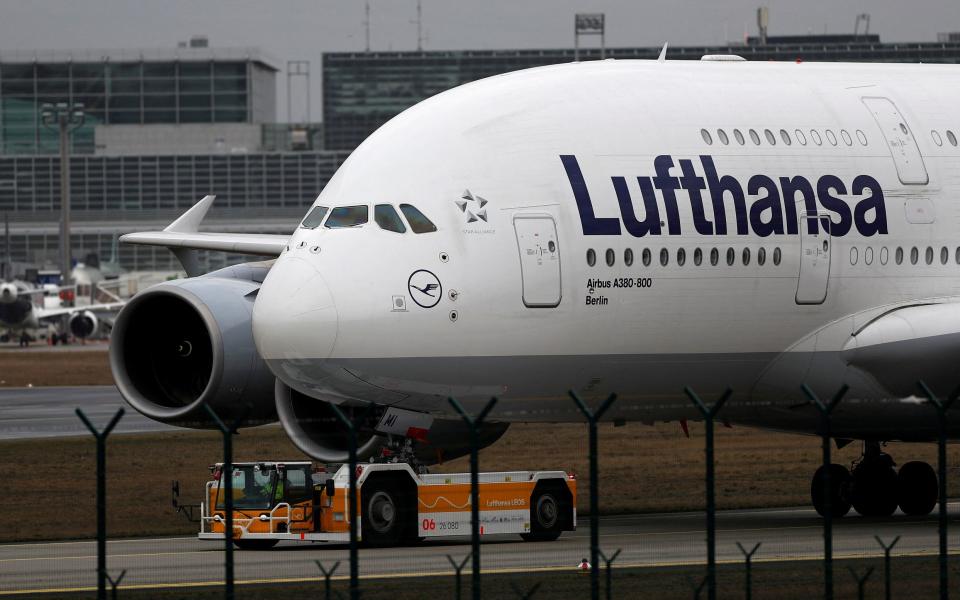
12:54 PM GMT
Commuter chaos as Aslef 24-hour rail strikes hit
Some of the busiest commuter rail routes in the country had limited services or no trains at all on Wednesday because of more strikes by drivers in their long-running dispute over pay.
Members of the Aslef union at South Western Railway, Southern, Southeastern, Gatwick Express and the Isle of Wight’s Island Line walked out on Wednesday morning for 24 hours in the latest in a series of stoppages this week which are causing travel chaos.
Aslef says its members are determined to continue taking industrial action until they receive an improved pay offer on one made earlier this year of 8 per cent over two years.
Train operators and the Government are urging Aslef to put the offer to a ballot, but the union points out that its members have regularly voted to continue taking strike action.
Here is everything you need to know about the walkouts.
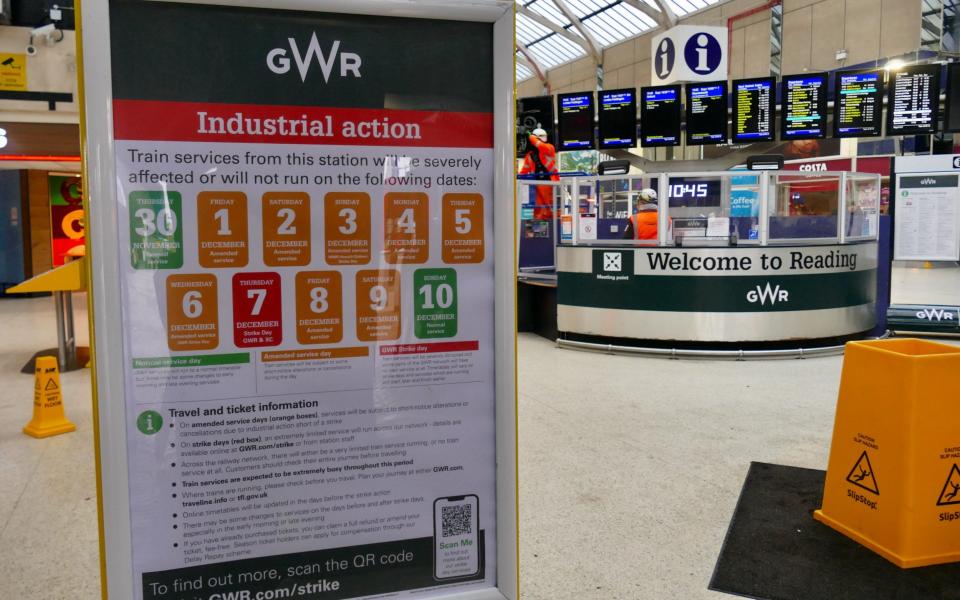
12:10 PM GMT
Pound hits three-month high against the euro as German economy struggles
The pound has hit its strongest against the euro in three months after Germany’s construction and manufacturing sectors slumped.
The euro dipped as much as 0.2pc against the pound to 85.54p, its lowest since early September, before recovering a touch to trade down 0.1pc on the day.
The move comes as German factory orders unexpectedly shrank in October, while its construction sector has fallen into a “perilous plunge” according to private sector data.
It also comes as markets increasingly bet that the European Central Bank will cut interest rates heavily next year, with traders pricing in a reduction by one and a half percentage points in 2024.
The pound was also steady against the dollar at $1.26, just about keeping in sight of last week’s near four month high of $1.2733.
Jane Foley, head of FX strategy at Rabobank, said: “Bank of England policy makers have been pretty consistent in saying the labour market is too tight and it’s too early to consider talking about interest rate cuts, and inflation is a bit higher in the UK than in the euro zone or the US.”
She added that as a result “the market is thinking that the ECB could be cutting rates first, then the Fed and then the Bank of England.”
11:44 AM GMT
Bank of England ‘watching’ impact of mortgages into retirement
Asked a question by our deputy economics editor Tim Wallace, deputy governor Sarah Breeden said there had been “quite an increase in the number of long dated mortgages 35 years and above”.
While this was mostly “focused on younger first time buyers”, over the last two decades their prevalence has increased across the market.
She said:
The important thing is lending into retirement when people might not have that income.
We don’t think of that as a financial stability risk but it is something we’re watching.
11:38 AM GMT
Businesses need to understand AI before using it, says Bailey
Andrew Bailey said businesses need to understand AI and its implications before using it in their operations.
The Governor of the Bank of England compared the risks associated with artificial intelligence to those experienced by investors who used algorithmic trading.
He said Britain should embrace AI “with our eyes open” and that using it without full understanding is “a recipe for trouble”.
He said it is not out of control “ in the sense of 2001 Space Odyssey” but “it is complicated” and “understanding exactly what the black box delivers can be very hard”.
He added: “If you are going to use if for real you cannot have that sort of thing happening.”
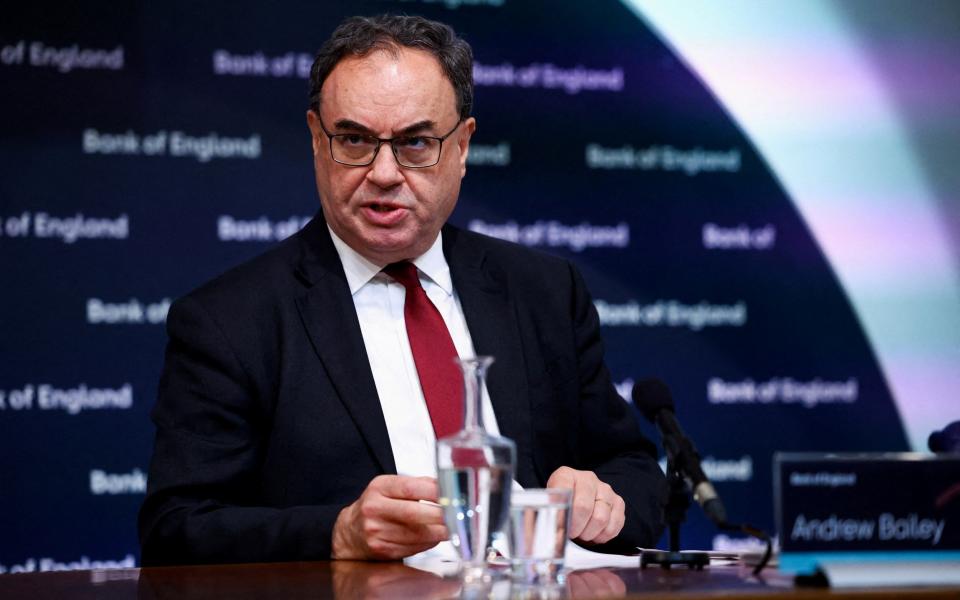
11:29 AM GMT
Global risks to economy have increased, warns Bailey
Andrew Bailey said global risks have also increased, pointing to the problems in China’s commercial property sector and the conflict in Gaza.
The Governor of the Bank of England said the war between Hamas and Israel has “increased uncertainty around the economic outlook, particularly with respect to energy prices”.
“If those risks crystallise, it could impact the macro economic outlook in the UK and globally,” he said.
11:17 AM GMT
Bailey pays tribute to ‘wise and kind’ Alistair Darling
Andrew Bailey ended his opening remarks with a tribute to former chancellor Alistair Darling, who died last week aged 70.
The Governor of the Bank of England said he was “wise, kind and had a wicked sense of humour”.
He said Mr Darling, who was chancellor as Britain dealt with the fallout from the global financial crisis in 2008 and 2009, “dealt with almost unimaginable situations in a professional way”.
He added Mr Darling “showed why preserving financial stability is so important”.
11:14 AM GMT
Full impact of interest rates yet to be felt, says Bailey
Governor Andrew Bailey concluded his opening remarks by saying that “while the overall risk environment has not materially changed” since the last financial stability report in July “it remains challenging”.
He added that the financial system “has so far been resilient to the impact of higher interest rates”.
However, he acknowledged that the “full impact has yet to be felt” from rates, which stand at 15-year highs of 5.25pc.
11:10 AM GMT
Credit lending ‘subdued’ as households stretched, says Bailey
Bank of England governor Andrew Bailey has begun a press conference after releasing its latest financial stability report.
Looking at the credit market, he said that “overall lending remains subdued reflecting reduced demand from borrowers as well as more caution from banks over the last two years”.
He acknowledged that household finances “remain stretched by the high cost of living” and said there had been an increase in arrears for borrowers.
However, Mr Bailey said: “Mortgage arrears are likely to remain well below the 2008 peak.”
11:02 AM GMT
Morrisons and M&S used unlawful land deals, watchdog rules
Morrisons and Marks & Spencer used unlawful land agreements to stop rival supermarkets opening nearby stores, according to the competition watchdog.
The Competition and Markets Authority (CMA) said it has taken action against the retailers to address 65 agreements which restricted local competition.
This included 55 breaches by Morrisons and 10 breaches by M&S.
Adam Land, senior director of remedies business and financial analysis at the CMA, said:
At a time when the weekly shop is a source of financial pressure for many families, it’s crucial that competition between supermarkets is working well to help people get the best deals they can.
These restrictive agreements by our leading retailers are unlawful.
There can be no excuses made for non-compliance with an order made in 2010, especially when we know the positive impact for shoppers of new stores on the high street.

10:39 AM GMT
Five million face £240-a-month mortgage within three years, warns Bank of England
Five million families face paying an extra £240 per month on their mortgages by the end of 2026 as the last of the cheap fixed-rate loans come to an end between now and the end of 2026, the Bank of England has warned.
Our deputy economics editor Tim Wallace has the latest:
The increase comes on top of the 5.5m who have already lost their bargain mortgages since the Bank started raising rates at the end of 2021.
Its base rate now stands at 5.25pc, up from 0.1pc two years ago.
Households overall are on track to spend around 9pc of their incomes on servicing their mortgage debts in three years’ time, up by half from 6pc before the Bank started its cycle of rate rises.
However, officials on the Financial Policy Committee, led by Andrew Bailey, the Governor, are less worried than they were earlier in the year because mortgage rates have started to fall and pay is rising faster than previously expected.
10:29 AM GMT
Overhaul planning to give less power to land owners, says Lord Wolfson
Britain’s planning broken system means that people “have lost faith” in building, the boss of Next has warned.
Our economics reporter Melissa Lawford has the details:
Next chief executive Simon Wolfson called for an overhaul of the system that will give people less power to object to new homes.
Speaking at an event at the London School of Economics and Political Science on Tuesday evening, Lord Wolfson said: “When you buy a home with a beautiful view, you don’t buy the view. It’s not yours, all that land around your house.”
He added: “Where property owners take onto themselves the rights of ownership of all the land around and begin to talk as if they should control what is built, in essence what we’re doing is we are putting the power of greater property ownership in the hands of people who already own.”
Building Next’s warehouses can take less time than the three or four years it takes to get planning permission, Lord Wolfson said.
“People begin to think that actually new buildings are bad and therefore we need more planning to stop it.”
Extremely high land costs are also a major drag on new building, he said.
“In the small village that I live just outside Milton Keynes, an acre of agricultural land is worth about £15,000. An acre of land with planning permission for housing will be worth about £1.5m,” he said. “That’s where all the money’s going, all the money that could be invested in better quality homes … All of that money is swallowed up in the land.”
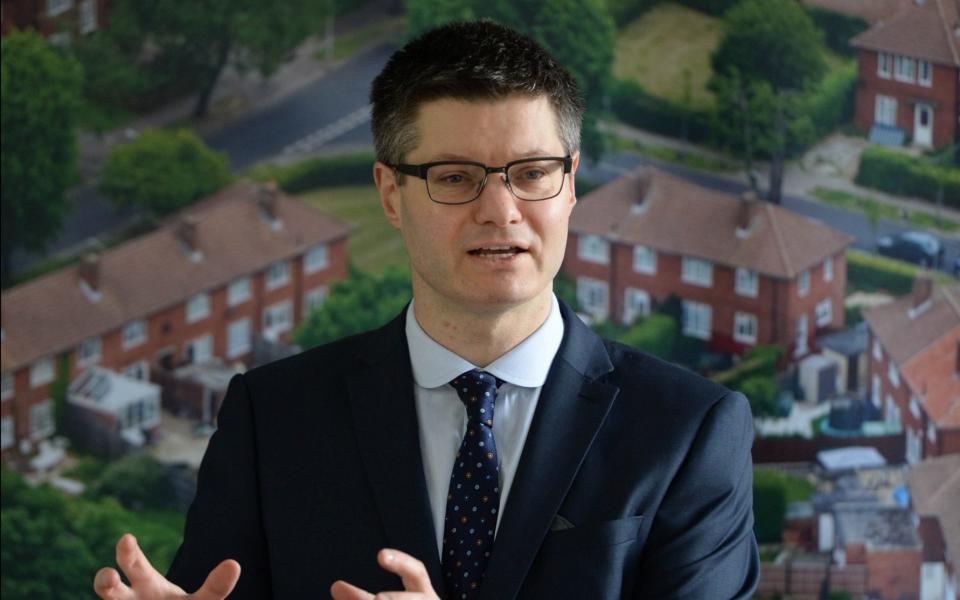
10:05 AM GMT
German construction in a ‘perilous plunge’
Germany’s construction sector remained in a deep recession in the final quarter of the year, latest survey data showed.
The HCOB Germany Construction purchasing managers’ index (PMI) showed activity fell sharply across all segments of construction, delivering a reading of 36.2 in November, which was the lowest in three-and-a-half years.
A rapid decline in housebuilding was blamed on the fall.
Dr Cyrus de la Rubia, chief economist at Hamburg Commercial Bank, said:
The building sector in Germany is experiencing a perilous plunge, with commercial building activity and civil engineering
witnessing an escalated fall in November.The housing segment, leading the descent with a rapid decline, persists in cutting construction activity at a relentlessly depressive pace.
The new order figures offer no respite, tumbling at a similarly dramatic rate as in October. Thus, a recovery remains elusive.
09:46 AM GMT
Samir Shah announced as new BBC chairman
Samir Shah has been announced as the new chairman of the BBC.
The 71-year-old veteran TV executive will take over from Richard Sharp, the former Goldman Sachs banker who resigned earlier this year.
Shah, whose television career spans four decades, was previously the non-executive director of the BBC, as well as serving as the head of current affairs.
Read on for the latest on this breaking story.

09:41 AM GMT
Housebuilding slump among fastest since 2009
House builders reported a sharp drop in activity in November as they were hit by rising borrowing costs and a fall in new projects, according to a closely-watched survey.
Construction output fell to 45.5 in November, its second lowest since May 2020 during the first Covid lockdown, according to the S&P Global/CIPS UK construction purchasing managers’ index (PMI). A reading below 50 indicates the sector is contracting.
The industry was dragged down by housebuilding, which dropped to 39.2.
Tim Moore, economics director at S&P Global Market Intelligence, said:
A slump in house building has cast a long shadow over the UK construction sector and there were signs of weakness spreading to civil engineering and commercial work during November.
Residential construction activity has now decreased in each of the past 12 months and the latest reduction was still among the fastest seen since the global financial crisis in 2009.
Elevated mortgage costs and unfavourable market conditions were widely cited as leading to cutbacks on house building projects.
09:20 AM GMT
Oil edges down as US exports flood market
Oil inched down further after a four-day drop amid a flood of US exports and doubts over whether Opec+ will be able to deliver on its planned production cuts.
Global benchmark Brent traded down 0.1pc toward $77 a barrel after slumping by more than 7pc over the previous four sessions, while West Texas Intermediate was down 0.3pc close to $72.
American crude shipments are nearing a record six million barrels a day, according to estimates from ship-tracking firms.
Crude’s decline since the Opec group and its allies announced deeper output cuts on Thursday shows the market is sceptical about whether the voluntary reductions will be implemented.
Oil has dropped by almost a quarter from a peak in late September on concern increased production from outside the group will outstrip demand growth.
08:59 AM GMT
BAT takes £25bn hit on US cigarette brands
British American Tobacco (BAT) has said it will book a £25bn impairment charge on some of its US cigarette brands.
The tobacco giant behind Dunhill and Lucky Strike linked the charge to “the current macro-economic headwinds impacting the US combustibles industry” and its long-term strategy to shift away from traditional cigarettes.
It added: “This accounting adjustment mainly relates to some of our acquired US combustibles brands, as we now assess their carrying value and useful economic lives over an estimated period of 30 years.”
It came as the business said revenue growth for the current year is set to be at the “low end” of its 3% to 5% guidance, amid pressure on the US market.
Its shares have fallen 7.9pc.

08:38 AM GMT
Dax hits record high as markets bet on interest rate cuts
European shares gained on rising bets of a peak in global interest rates as Germany’s benchmark Dax scaled a fresh all-time high.
The pan-European STOXX 600 index has climbed 0.3pc, while the Germany’s DAX also rose 0.2pc to 16,564.85.
It comes as traders increase bets on interest rate cuts next year from the European Central Bank. Money markets are fully pricing in 150 basis points of cuts in 2024.
Basic resources gained 1.3pc tracking a rise in prices of most base metals.
Investors now await eurozone construction purchasing manager’s index data for November, along with October retail sales to gauge the strength of the European economy amid recession concerns.
Focus was also on US November ADP national employment report after a drop in October job openings to more than a two-and-a-half year low on Tuesday boosted expectations the Federal Reserve’s monetary policy tightening cycle was over.
Merck sank 13.4pc after the pharmaceutical company’s experimental multiple sclerosis drug evobrutinib did not meet the primary goal in late-stage trials.
08:28 AM GMT
Metal prices boost FTSE 100
The FTSE 100 has risen in early trading after gains in mining stocks amid rising metals prices.
The blue-chip index has risen 0.4pc, while the more domestically-focussed FTSE 250 midcap index added 0.6pc.
Industrial metal miners led the gains, climbing 1.8pc as prices of most base metals and iron ore rose.
Precious metal miners also jumped 1.2pc tracking higher gold prices.
However, British American Tobacco tanked 6.3pc after the maker of Lucky Strike cigarettes said it would take an impairment charge of around £25bn as it reassessed the value of some of its US cigarette brands.
Ocado Group gained 2.9pc after JP Morgan upgraded the online supermarket’s stock to “neutral” from “underweight.”
Investors will be watching later for the November S&P Global/CIPS construction purchasing managers’ index (PMI) data.
08:20 AM GMT
Rouble lowest in a month as foreign currency sales fall
The Russian rouble fell to a more than one-month low past 93 to the dollar as it came under pressure from exporters’ reduced foreign currency sales at the start of the month.
The rouble was 0.7pc weaker against the dollar at 92.90, earlier hitting 93.04, its weakest point since November 3.
It lost 0.3pc to trade at 100.28 versus the euro, shed 0.8pc against the yuan to 12.98 and fell to 117 to the pound.
The rouble has now lost support from the month-end tax period, for which Russian exporters usually convert foreign currency into roubles.
Before last week, the currency had enjoyed seven weeks of gains. It has rebounded from more than 100 to the dollar, thanks to reduced capital outflows since President Vladimir Putin introduced the forced conversion of some foreign currency revenue for exporters in October.

08:06 AM GMT
UK markets open higher
The FTSE 100 opened higher after data pointing to a softening US labour market added to hopes the Federal Reserve will cut interest rates in the new year.
The UK’s benchmark index has gained 0.1pc to 7,497.25 while the midcap FTSE 250 rose 0.2pc to 18,518.39.
07:58 AM GMT
German factory orders fall
German factory orders unexpectedly fell in October, highlighting how manufacturing in Europe’s largest economy remains stuck in a rut.
The latest data show a 3.7pc decrease in demand — defying analysts who had predicted a 0.2pc gain. September’s advance, however, was revised up to 0.7pc.
The slump was driven by a 13.5pc drop in machinery and equipment that could npt offset a 20.2pc jump in new orders in the manufacture of transport equipment including aircraft, ships and trains, the statistics agency said.
A plunge in big ticket orders dragged down incoming business for German industry in October. But core orders rose a touch and have overall been stable (at very low levels) since March. Still looks like bottoming out to me as intermediates see a gentle recovery. https://t.co/D9VTJbVFKQ pic.twitter.com/lfH5XKVd3A
— Oliver Rakau (@OliverRakau) December 6, 2023
07:45 AM GMT
Ten Entertainment agrees private equity takeover
Bowling centre operator Ten Entertainment has agreed a £287m takeover by US private equity firm Trive Capital.
The ten-pin bowling firm, which runs 52 sites across the UK, told shareholders its board is recommending the deal to buy the business at 412.5p per share in cash.
Dallas-based firm Trive set up a new company, called Neon Buyer, to make the acquisition.
Adam Bellamy, the chairman of Ten Entertainment, said:
I am confident that the growth strategy we have in place for the business will continue to deliver for all our stakeholders.
However, whilst TEG (Ten Entertainment Group) has performed well in the public markets in comparison with its peers, the acquisition provides all TEG Shareholders with the opportunity and certainty of an exit which I believe recognises the underlying value in our business.
The price offered by Neon Buyer represents an attractive premium to TEG’s prevailing share price and accordingly the TEG directors have no hesitation in recommending the offer to our shareholders.
07:41 AM GMT
Tui revenues hit record high
Tui announced its delisting plan as it swung to a full-year profit thanks to record revenues and expects sales to surge by at least 10pc over the year ahead as prices continue to rise.
The group reported pre-tax earnings of €551.2m (£471.9m) for the year to September 30 against losses of €145.9m (£124.9m) the previous year.
Underlying earnings more than doubled to €977.2m (£836.7m) as revenues hit an all time high of €20.7bn (£17.7bn) – “significantly” higher than before the pandemic, according to the group.
Tui said it expects underlying earnings to jump by at least 25pc over the new financial year, with sales set to jump by another 10pc at least.
Its saw higher average prices for holidays and air travel over the year and said this was continuing into the winter season, with bookings up 11pc and average prices 5pc higher.
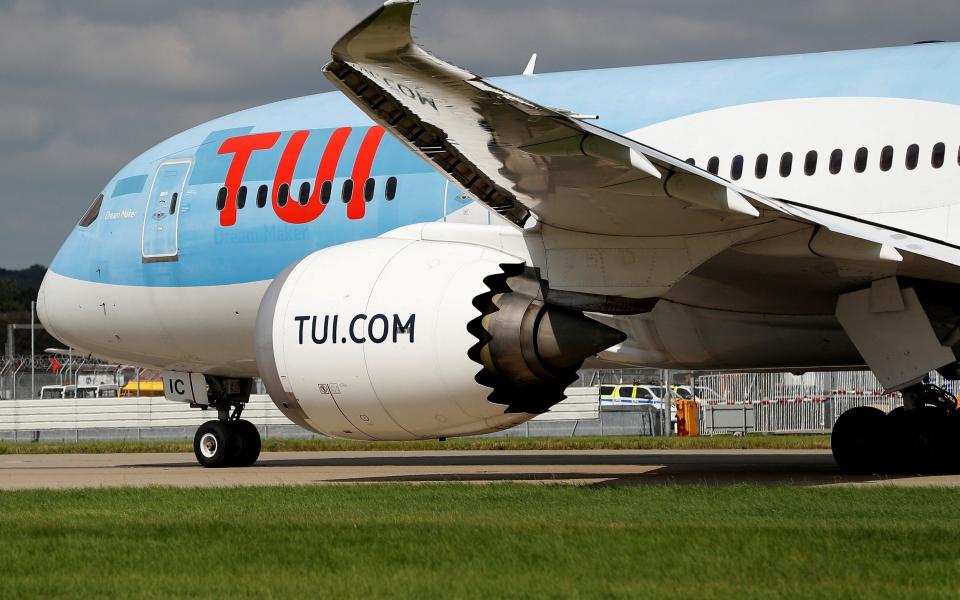
07:25 AM GMT
Tui explores delisting from the London Stock Exchange
Tui is considering delisting from the London Stock Exchange as returns from the UK’s flagship shares index lag behind European peers.
The holiday company said it had been approached by shareholders concerned about whether its current listing is “optimal and advantageous”.
Bosses said there had been a “notable liquidity migration from UK to Germany” in the ownership of its shares over the last four years.
As a result, they will consider holding a vote on leaving the London Stock Exchange at the company’s AGM in February, instead proposing listing on Germany’s MDax market, the index directly below its flagship Dax.
The resolution would need the backing of 75pc of shareholders to take effect.
The statement said: “In light of the views expressed by shareholders and any further feedback from shareholders, the executive board is currently considering, if an upgrade to a prime standard listing in Frankfurt with MDax inclusion and a delisting from the London Stock Exchange would be in the best interest of shareholders.”
It comes a day after the Dax index in Frankfurt hit a new record high, while the FTSE 100 closed lower for a second consecutive day.
In a statement in the company’s full year results, bosses said:
The executive board’s focus is to provide an attractive, long-term listing for Tui which aligns with its ownership and current liquidity and delivers benefits to all shareholders.
Potential advantages of simplification of the listing structures and an inclusion in the MDax are the centralisation of liquidity, providing a clearer investment profile under a single listing, potential benefits to European Union airline ownership and control requirements, potentially enhancing Tui’s equity profile with an expected prominent position in the MDax50 and creating efficiencies as well as reducing costs.
While no decision has been taken, the executive board is therefore currently considering including the UK-Delisting resolution on the agenda for the AGM on 13 February 2024.
Under the UK Listing Rules, the UK-Delisting will require shareholder approval of a delisting resolution with at least a 75pc majority of the votes cast.

07:18 AM GMT
Good morning
Thanks for joining me. Tui is considering delisting from the London Stock Exchange and moving its shares to Germany after concerns were raised by shareholders about where they could get the highest returns.
The announcement comes a day after Frankfurt’s Dax market hit a new record high.
5 things to start your day
1) Record share of first-time buyers take out 35-year mortgages | More borrowers aim to get on the property ladder by signing up for a lifetime of debt
2) UAE invests in UK’s struggling wind farm market | Masdar snaps up 49pc stake in one of Britain’s largest renewables sites
3) China’s great wall of debt sparks credit rating outlook downgrade | Ratings agency warns a third of the country’s debt could be at risk of default
4) German carmakers accused of supplying Putin’s Russia through the back door | Exports of vehicle parts to Kyrgyzstan reportedly surge by 5,500pc despite sanctions
5) Jeremy Warner: The debt curse that is destroying corporate Britain | Taxman’s incentivisation of leveraged borrowing can have disastrous consequences
What happened overnight
Asian stocks gained as traders increased bets that interest rates have peaked among major central banks globally, pushing down bond yields.
Benchmark 10-year Japanese government bond yields dipped to their lowest since mid-August at 0.62pc, tracking an overnight slide for equivalent US Treasury yields as cooling job vacancy data indicated that the Federal Reserve has finished raising rates.
US 10-year yields touched a three-month trough of 4.16pc on Tuesday before ticking up slightly to nearly 4.2pc in the latest session. Bets on a first Fed cut coming by March now stand at about 64pc, according to the CME Group’s FedWatch tool.
Lower borrowing costs boosted equity markets, with big tech a particular beneficiary.
The benchmark Nikkei 225 index was up 2pc, or 670.08 points, to end at 33,445.90, while the broader Topix index added 1.9pc, or 44.51 points, to 2,387.20.
Australia’s S&P/ASX 200 rose 1.7pc, Hong Kong’s Hang Seng rose 1.3pc and the Shanghai Composite rose 0.2pc.
The S&P 500 was nearly unchanged, dropping 0.1pc on Tuesday to 4,567.18, while the Dow Jones Industrial Average of 30 leading American companies was down 0.2pc to 36,124.56.
The technology-heavy Nasdaq Composite rose 0.33pc to 14,229.91.
Source: finance.yahoo.com
